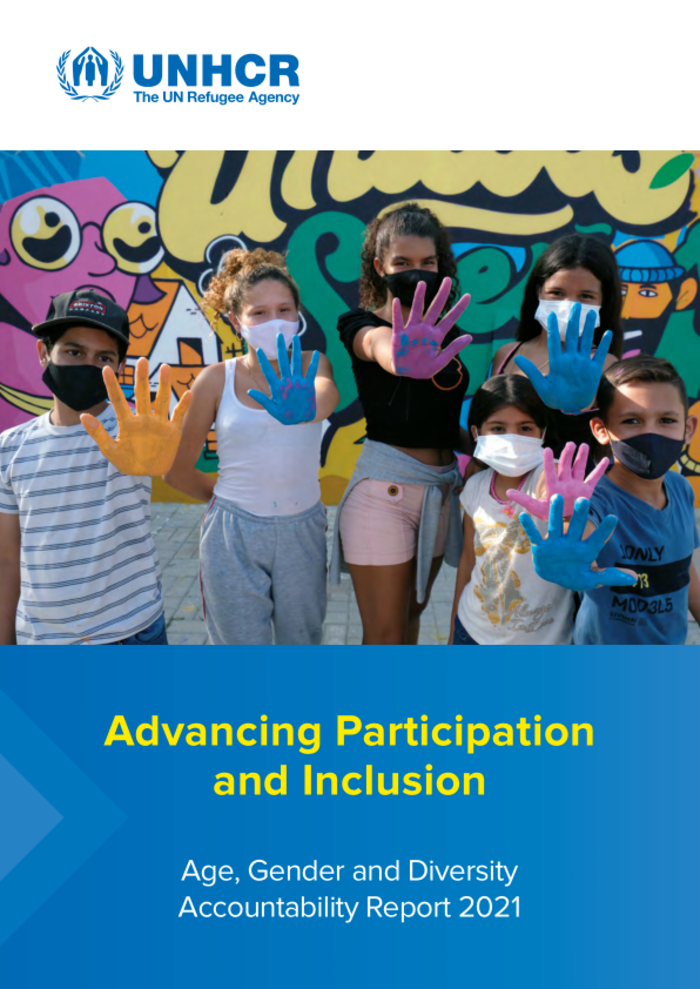EXECUTIVE SUMMARY
Introduction
The Age, Gender and Diversity (AGD) Accountability Report 2021 provides an overview of the work undertaken by UNHCR (the UN Refugee Agency) to ensure the AGD approach is mainstreamed across operations and field-level practices. It does so in the context of combined ongoing global challenges, notably the COVID-19 pandemic, the increasing effects of climate change and natural disasters, and protracted and emerging conflicts. In 2021, these factors continued to create uniquely complex and uncertain conditions for the people served by UNHCR, as well as for the organization’s capacity to respond to the diverse needs and situations that they generated.
Forcibly displaced and stateless persons are among the hardest hit by these global challenges, which have put unprecedented pressure on them. The continuation of the COVID-19 pandemic in 2021 has further aggravated economic insecurity and further hampered access to health and protection services. Fear of infection, restricted mobility, isolation measures, stigma, discrimination, loss of livelihoods and uncertainty about the future have increased vulnerability to protection risks for all, and particularly for women, children and those living with disabilities.
This report draws on the analysis of available quantitative and qualitative data on the areas of engagement in line with the core actions in the 2018 UNHCR Policy on Age, Gender and Diversity (hereafter the 2018 AGD Policy).
The report also includes six spotlights on particular groups among the populations that UNHCR works with and for. Consultations with key UNHCR staff were also held to further inform and guide the selection of relevant practices. Using examples and significant practices from 2021, the report intends to illustrate the commitment and accountability of UNHCR towards the 2018 AGD Policy, the organization’s ever-adaptive capacity to implement AGD-sensitive interventions, and the evolving and wide-encompassing nature of the AGD approach.
Key findings
2021 marked the tenth year since the first UNHCR Policy on AGD was adopted, and the fourth year since it was reframed into the updated 2018 AGD Policy. Throughout the year, UNHCR continued to champion this approach both internally across its operations and externally in its relationships with key stakeholders and within the wider United Nations system. This resulted in a wealth of initiatives to promote AGD inclusion that UNHCR either led or actively contributed to, a summary of which can be found in the relevant sections of this report.
Efforts to advance and further consolidate the AGD approach developed into a new strategic framework on accountability to affected people (AAP); the roll-out of the newly established Policy on the Prevention of, Risk Mitigation and Response to Gender-Based Violence; the UNHCR’s five-year Action Plan for Disability Inclusion; and the Global Roundtable on Protection and Solutions for Lesbian, Gay, Bisexual, Transgender, Intersex and Queer (LGBTIQ+) Persons in Forced Displacement (June 2021).
Operationally, the focus has been on further localizing the response, as well as on establishing a more effective and incisive partnership with forcibly displaced and stateless persons, and organizations representing their voices, in the design and implementation of programmes. A good example of this was in UNHCR’s work on youth in 2021, including through the Global Youth Advisory Council (GYAC), where UNHCR underlined the importance of localization by encouraging youth networks in various operations and by emphasizing the role of GYAC members in promoting youth-led actions within their communities.
Nonetheless, there is still some important work to be done to ensure the 2018 AGD Policy is implemented to its full extent, as also highlighted by the recently published interim report of the longitudinal evaluation of the AGD Policy. Among the constraints identified are the lack of a uniformed and harmonized approach to diversity in all its dimensions (at both the global and field levels and across operations) and limited incentives to date to encourage compliance with the policy, including through the existing monitoring and reporting systems.
More specific findings are illustrated throughout the report and summarized in the following paragraphs for each area of engagement and related core actions.


